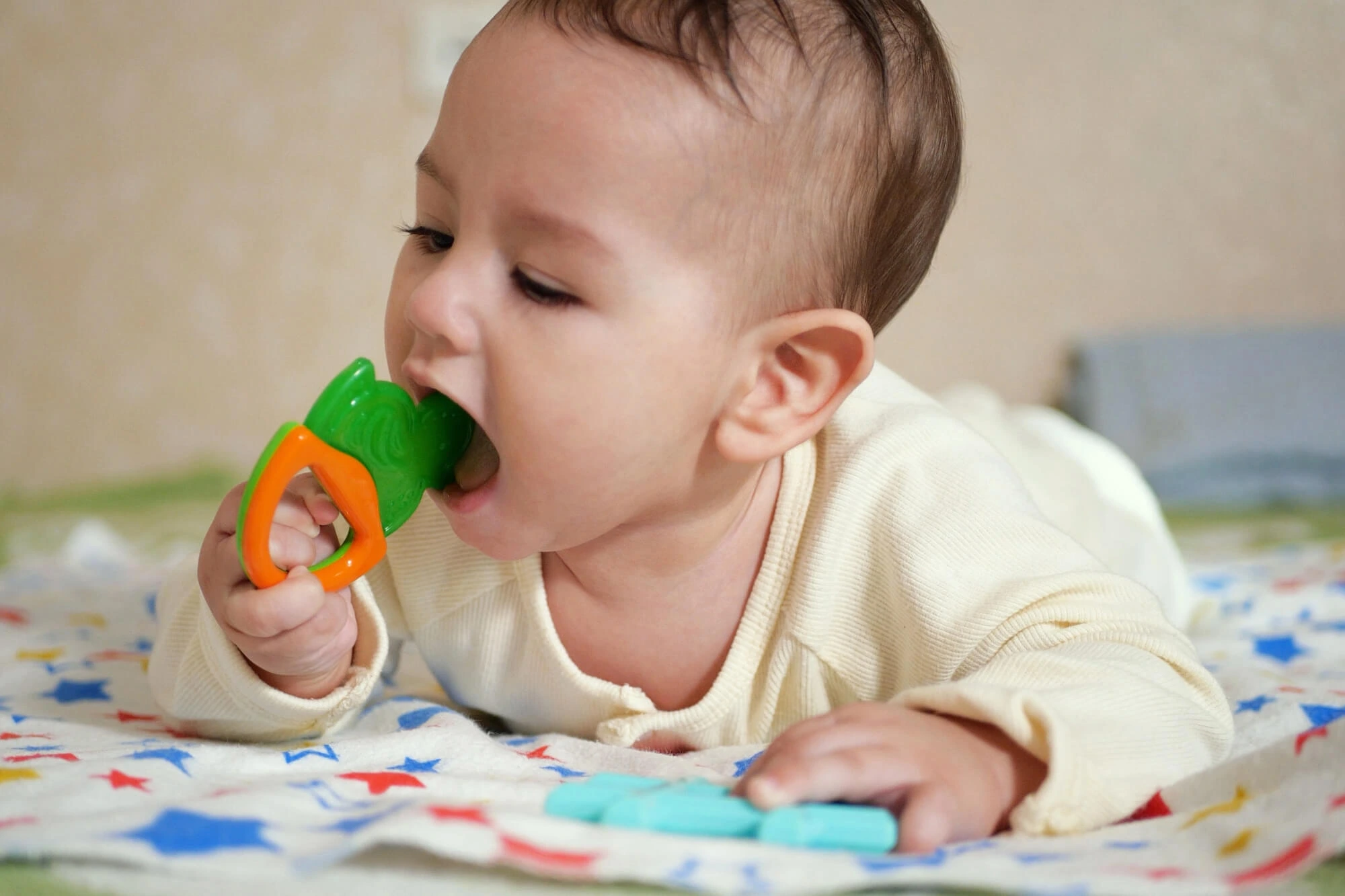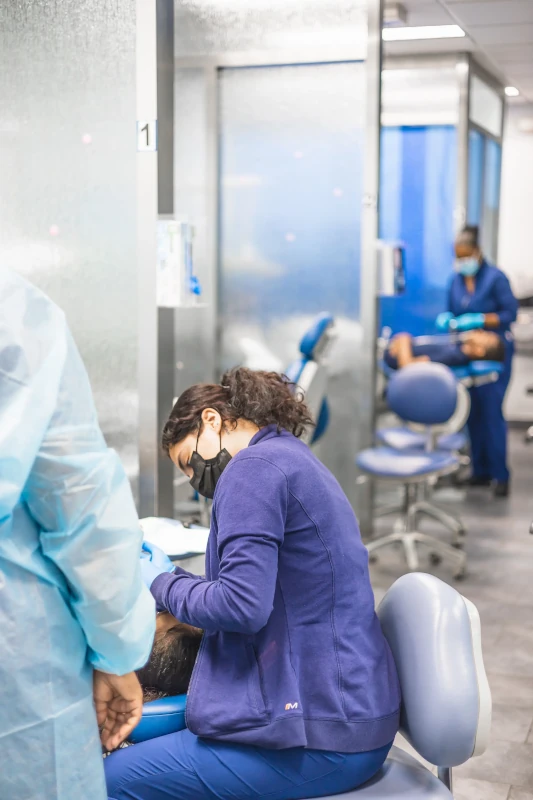Post
Teething Troubles: Dos and Don'ts to Support Your Baby During This Period
Teething is a significant developmental milestone for your child. It signals that they can begin eating solid foods gradually, that oral hygiene is now a top concern, and that you should begin searching for a pediatric dentistry near you for their first dental appointment.
However, teething can be stressful even though it's a time for celebration. To help you navigate this important time in your child's smile development while ensuring the best for their oral and overall health, we created this guide.

So, What Is Teething?
The period of time when your baby's teeth begin to erupt through their gum line is called teething, or odontiasis. Usually beginning between the ages of 4 and 7 months, this process can conclude when the child reaches the age of 3.
There’s a common misconception that when a baby’s teeth start to emerge, they cut through their gums, causing pain. However, once a baby’s crown starts to emerge, in reality, the body releases hormones that break down the gums, making this process easier.
This doesn’t mean that teething is free of pain, though. As those hormones do their job, they cause the gums to swell and become tender, causing irritation and discomfort to your baby.
How Long Does Teething Last?
Teething isn’t a stable process—it happens whenever a tooth is ready to break through the gums and stops once it has already emerged. Most baby teeth (the primary teeth) come through by about 12 months, and then the molars come in between 13 and 19 months.
Signs That Your Baby Is Teething
Chances are high you’ll realize once your baby’s first teeth start to emerge. Fussiness, constantly bringing objects to their mouths, and even fever are some noticeable signs that the teething process has begun. However, other potential indicators to look out for include:
- Tender, swollen gums
- Increased crying
- Temperature slightly elevated (less than 100.4 F)
- Wanting to chew on something hard or gnawing
- A lot of saliva, which can result in a facial rash
- Coughing
- Pulling their ear or stroking their cheek
- Putting their hands in their mouth
- Changes in their sleeping or eating habits
Teething can be painful, but it shouldn’t make your baby sick. If they have diarrhea, vomiting, rashes on the body, a higher fever, or coughing and congestion, call your doctor right away, as these aren’t normal signs of teething.
You should also contact your pediatrician if your baby's gums are bleeding or if you notice any pus or swelling on their face.
Does Teething Cause Fever?
Sometimes, babies who are teething get low-grade fevers. This is when the body temperature is slightly above normal, between 100 and 100.4 F. Some people call this teething fever. If your baby has a higher fever while teething, there is probably another cause aside from teething, and you should contact your doctor.
A Hidden Side Effect: Teething Rash
While teething, some babies develop rashes on their cheeks, chins, and chests. This is not a side effect of their developing teeth; it is caused by excessive drooling, which is common during this period. This drool irritates the skin and causes a rash.
To prevent rashes, wipe away drool from your baby’s face, chin, or chest.

How to Soothe a Teething Baby?
Now, you know how to identify the signs of a fussy teething baby—but what can you do about it? Before trying any soothing technique you see online, it’s important to inform yourself to avoid dangerous practices that may harm your child.
Some safe practices to soothe teething babies include:
Teething Toys
Teething babies like to chew on things, so you can give them a teething toy or ring. Kudos if it’s cool, as it can help reduce inflammation and soothe sore gums.
Avoid teethers filled with liquid, which can leak, or freezable teethers, which may be too cold or hard and hurt your baby's mouth. Instead, a refrigerated teething toy or even a clean, wet washcloth can help. You can also refrigerate their pacifier for relief as a natural remedy for the pain.
Never tie a teether or teething ring around your baby's neck: they’re dangerous choking hazards.
Teething Medicine
With your pediatrician's approval, you can give your baby a small dose of a children's pain reliever, such as acetaminophen (Tylenol) for babies at least 2 months old and ibuprofen (Motrin) for babies 6 months and older. Ibuprofen should not be given to infants under the age of six months. Before giving your baby any medication, consult your doctor and follow their instructions exactly.
Teething medications that are applied topically to your baby's gums are frequently ineffective at relieving pain because they quickly dissolve in the mouth and may instead numb the back of the throat, making swallowing difficult.
Avoid, in particular, over-the-counter teething gels and liquids that contain the chemical benzocaine. According to the FDA, children younger than two shouldn't be given this ingredient as it can cause rare but serious side effects.
Massage
Your baby's gums might feel better if you rub them gently. After washing your hands, give your infant a finger or knuckle to nibble on. You can see if they like it by rubbing it in a circular motion.
Breast Milk
Some breastfed babies will want to feed for longer periods of time because nursing can ease the teething process. Other babies might have to bottle feed since sucking might hurt their gums.
If your baby is breastfed, rubbing your finger in cold water before feeding could prevent them from chewing your nipple.

Search “Pediatric Dentistry Near Me” And Put Your Baby’s Oral Health on the Right Track!
Teething is a hard time for your baby—and for you, too. However, by knowing how to navigate this period safely, you can reduce your baby’s discomfort and ensure their first set of teeth comes out healthy and strong.
Once the first tooth fully emerges—or they turn one year old—it’s time to reach out to Perfect Smiles Doc for their first complete checkup. We’ll ensure their teeth come out safely, provide oral hygiene tips, and get them used to the dentist, laying the groundwork for a lifetime of healthy smiles!
Not Sure if You’re Covered?
Your Perfect Smile is within reach, and we're here to help you every step of the way. We can streamline the process for you by contacting your insurance company and acquiring a detailed breakdown of your specific plan information. Let us take the guesswork out of navigating insurance and payment options.
Learn More

555 E FORDHAM RD BRONX, NY 10458
MONDAY TO FRIDAY 9:00 AM – 6:00 PM
SATURDAY 8:00 AM – 2:30 PM
B
D
4
Bx12
Bx12+
Bx9
Bx15
Bx17
Bx22
Bx41
Bx34 B Bx1
Bx2
BxM4

468 E FORDHAM RD BRONX, NY 10458
MONDAY TO FRIDAY 9:00 AM – 6:00 PM
SATURDAY 8:00 AM – 2:30 PM
B
D
4
Bx12
Bx12+
Bx9
Bx15
Bx17
Bx22
Bx41
Bx34
Bx1
Bx2
BxM4

192 Dyckman St New York, NY 10040
MONDAY TO FRIDAY 9:00 AM – 6:00 PM
SATURDAY 8:00 AM – 2:30 PM
A
1
M100
Bx7
BxM1
Bx12
Bx12-SBS
Bx20
M3




.webp)